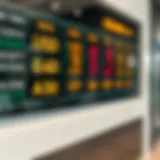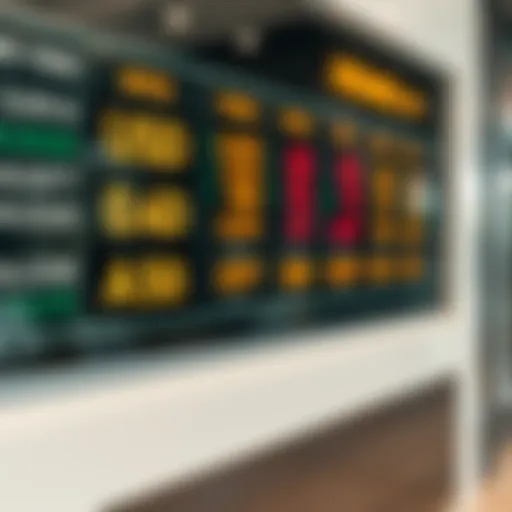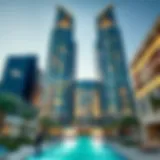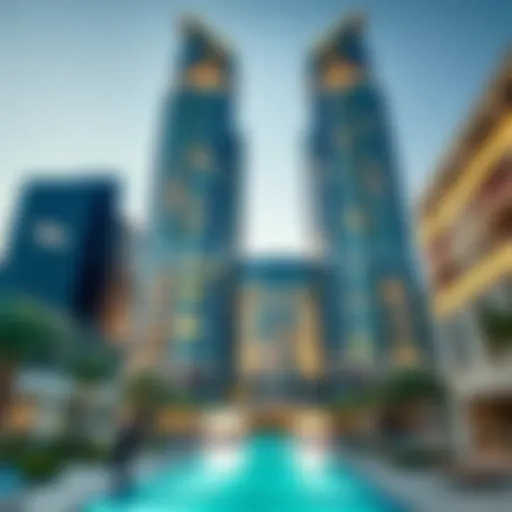Ramadan Schedule 2024 in the UAE: Key Dates and Insights
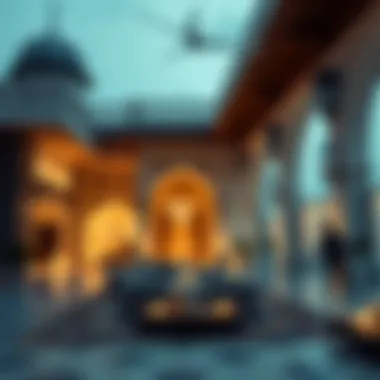

Intro
Ramadan is a month cherished by millions across the globe, particularly in the United Arab Emirates (UAE), where cultural traditions and religious observances blend harmoniously. In 2024, this holy month is expected to commence on the evening of March 10 and conclude with Eid al-Fitr around April 9. The significance of Ramadan transcends mere fasting; it's a time for reflection, community bonding, and spiritual growth. residents and visitors alike can anticipate a unique experience with the various cultural events and religious practices that come alive during this period.
Understanding the intricacies of the Ramadan schedule, particularly the fasting times, is crucial not only to the local population but also to expatriates and tourists navigating daily life in the UAE during this time. Businesses adapt their hours, special events take place, and it's essential to be in the know about how one can respect and participate in such a culturally significant time.
This article aims to provide a comprehensive overview of the Ramadan schedule for 2024 in the UAE, touching on important dates, various customs, and how this period influences sectors like real estate. For those looking to invest or navigate the market during Ramadan, understanding these cultural nuances is paramount.
The journey through this month's schedule includes:
- Fasting timings
- Key cultural events
- Market trends and property insights
As we delve deeper, readers will gain meaningful insights into the practices that define not just Ramadan itself but the spirit of the UAE as a whole. Whether you are a potential investor, a homebuyer, or simply an observer of this deeply rooted tradition, there's much to discover.
Preamble to Ramadan
Ramadan is a month of profound importance for millions of Muslims around the world. In the United Arab Emirates, this holy month is not only a time for spiritual reflection but also a period that influences various aspects of daily life. Understanding Ramadan is crucial for both residents and visitors as it sets the tone for the entire month. This section aims to delve into the historical context and cultural significance of Ramadan, laying the groundwork for the myriad ways it impacts the UAE.
Historical Context
Ramadan's roots trace back to centuries ago when it was established as a time of fasting and spiritual reflection. The practice is derived from the Quran, which describes the month as a time when the holy text was revealed to the Prophet Muhammad. As a result, Muslims view Ramadan not just as a month of fasting but as a significant moment in their religious history.
The Fast of Ramadan, or Sawm, is one of the Five Pillars of Islam, serving as both a spiritual obligation and a means of self-discipline. Historical accounts note how communities would gather for communal prayers at mosques and celebrate the month with acts of charity and kindness. Importantly, these traditions have been passed down through generations and are still observed today, creating a deep sense of continuity from the past into modern practices.
Cultural Significance
Ramadan is far more than a month of fasting; it carries a cultural weight that pervades every level of society in the UAE. The observance fosters a sense of unity among Muslims, as families often break their fast together at sunset, sharing Iftar meals that range from simple dates and water to elaborate feasts featuring a mosaic of traditional dishes.
Moreover, Ramadan encourages communal acts of kindness. During this month, you'll see a surge in charitable giving, known as Zakat. This practice emphasizes empathy and social responsibility, aligning perfectly with the UAE's values of community and compassion.
In public spaces, Ramadan changes the atmosphere. Decorations adorn streets, and special events are organized, transforming the city into a vibrant tapestry of culture. The sight of lanterns hanging outside homes and mosques is common, and it brings a festive mood that encapsulates the spirit of Ramadan.
Although often understood as a time for personal spiritual growth, it also reflects broader societal values like generosity, tolerance, and understanding.
As we navigate through this article, it becomes clear that the essence of Ramadan in the UAE extends beyond its historical and cultural significance. It greatly shapes daily life and influences economic and social interactions in this diverse nation.
Ramadan Schedule Overview
Understanding the Ramadan schedule is crucial for anyone residing or visiting the UAE during this holy month. This overview not only highlights the key dates and fasting times but also provides valuable insights into the culturally rich traditions and practices that define this significant time for Muslims. By grasping the nuances of the fasting schedule, individuals can better prepare themselves, whether it be for work, social gatherings, or community observances.
Key Dates
Start of Ramadan
The commencement of Ramadan is marked by the sighting of the crescent moon, which varies each year. The announcement for 2024 indicates that Ramadan will likely begin on the evening of March 10, subject to the moon's visibility. This moment signifies a spiritual recharge, inviting all believers to reflect, engage in prayer, and foster a sense of community. The unique character of this period is rooted in its potential for personal growth and communal bonding.
The benefits of being aware of this date are manifold. It enables families to coordinate their schedules for Suhoor (pre-dawn meal) and Iftar (evening meal), ensuring that they share those moments together, reinforcing familial ties. Additionally, understanding the start of Ramadan helps businesses and educators in planning ahead for changes in hours and activities.
End of Ramadan
The end of Ramadan culminates in the celebration of Eid al-Fitr, anticipated around April 9, 2024. This is a day of joy, marking not just the conclusion of fasting but also a time for thankfulness and community celebration. Eid al-Fitr is characterized by festive prayers, communal feasting, and handing out Zakat al-Fitr, a charitable gift intended to support those in need.
Recognizing the significance of the ending date brings clarity to various preparations that need to be made—like grocery shopping for Eid meals or coordinating gatherings. It allows people to embrace the culmination of their month-long sacrifices and welcome a sense of renewal in health and spirit.
Eid al-Fitr Dates
The specific date for Eid al-Fitr may still hinge on the moon sighting, mirroring the start of Ramadan. Yet, planning for April 9, 2024 provides individuals and businesses ample time to organize festive activities. This date stands out as a prominent marker of triumph—a celebration of successfully completing the month of fasting and spiritual engagement.
Eid al-Fitr is not solely a family affair; it also emphasizes community ties. Social gatherings, festive meals, and activities become instrumental in bridging relationships within neighborhoods. Therefore, knowing the date facilitates better access to events and allows families to come together, ensuring no one feels left out of the celebrations.
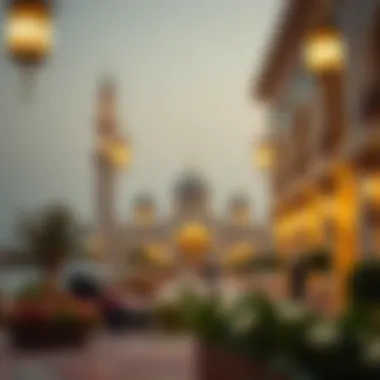

Daily Fasting Times
Suhoor Timing
Suhoor is the pre-dawn meal that takes place before the fasting begins. For 2024, Suhoor must conclude by 5:00 AM, aligning with the Fajr prayer timing. This meal is vital because it serves as not just nourishment but also a moment for reflection and connection among family members before the day of fasting unfolds.
Being aware of Suhoor timing equips individuals to make better dietary choices, ensuring they eat well-balanced meals rich in nutrients. This forethought also minimizes the temptation of feelings of hunger throughout the day. Moreover, as many restaurants and cafes operate under adjusted hours, knowing this timing helps to avoid confusion.
Iftar Timing
Iftar, the evening meal that breaks the fast, occurs at sundown, generally around 6:30 PM in March 2024. This is an enriching moment when families and friends gather to share food and experiences of the day. Iftar is characterized by traditions of sharing and giving, fostering a welcomed sense of togetherness.
Familiarity with Iftar timing assists both residents and visitors in planning their evenings. For businesses, striking a balance between operating hours and service offerings becomes vital. It encourages local restaurants to create special Iftar menus, attracting varied clientele while also ensuring that community engagements remain strong.
Observances and Practices
The observances and practices of Ramadan are central to the experience of the holy month. They play a significant role in promoting both personal reflection and community bonding. For many, these rituals foster a sense of spiritual growth and connection to faith. Engaging in daily prayers and acts of charity not only enhance one's spiritual journey but also strengthen ties within the community. The importance of these practices resonates deeply, encouraging individuals to live with compassion and mindfulness throughout Ramadan.
Prayer and Reflection
Taraweeh prayers
Taraweeh prayers are a distinctive feature of Ramadan nights. These prayers are an essential aspect of the month, offering a unique chance for additional worship. Performed after the Isha prayer, Taraweeh consists of reciting lengthy portions of the Quran, often leading to a sense of tranquility and reflective peace among worshippers. One key characteristic of Taraweeh is its communal aspect, as many people attend mosques together to observe these prayers. This collective experience not only elevates one’s spiritual awareness but creates bonds within the community.
However, attending Taraweeh can be demanding, especially for those with tight schedules. While it provides immense spiritual benefits, the long recitations may pose a challenge for some. Yet, for those committed to the practice, the sense of accomplishment and unity typically outweighs any discomfort.
Importance of Quran recitation
Reciting the Quran holds a sacred place during Ramadan, with many aiming to read it in its entirety by the end of the month. This practice fosters a unique connection to the text, enhancing understanding and devotion. One of the defining characteristics of Quran recitation is its ability to inspire contemplation. Many find that engaging with the Quran deepens their faith and lends insights into personal issues.
The act of recitation also comes with its own set of challenges. Some individuals may feel intimidated by the prospect of reading the Quran, particularly with its intricacies and depth. However, the rewards are numerous, as even small efforts in reading can bring about significant spiritual benefits. The unique experience of tapping into the ancient wisdom of the Quran can greatly impact one's life during Ramadan.
Charity and Community
Zakat and Sadaqah
Zakat and Sadaqah are two forms of charity that embody the spirit of giving during Ramadan. Zakat, often seen as a mandatory act of faith, is typically calculated as a percentage of one's wealth, aimed at supporting those less fortunate. On the other hand, Sadaqah is voluntary, allowing individuals to give according to their means. One of the most important characteristics of these contributions is the focus on selflessness and empathy.
Both practices serve to strengthen community ties and uplift the society as a whole. They encourage donors to engage with those in need, leading to shared understanding and respect. This act of giving is crucial, yet it might seem daunting for individuals unfamiliar with the process. Learning about Zakat and Sadaqah can enhance one’s understanding of the key tenets of Islam, ultimately fostering a more profound sense of purpose.
Community Iftars
Community Iftars present an enriching opportunity for both residents and visitors to partake in the breaking of fast together. These meals hold unique significance as they bring together individuals from various backgrounds, promoting inclusivity and unity. One aspect that sets community Iftar apart is the diversity of participants, each adding their own flavor to the event. Sharing food not only nourishes the body but also feeds the soul, generating warmth and camaraderie.
However, organizing such events can present challenges, particularly in ensuring a smooth logistical process. When done well, community Iftars can create lasting connections and friendships. They also serve as an excellent way for newcomers to feel welcomed and integrated into the local culture during Ramadan.
Impact on Daily Life
Ramadan significantly influences various aspects of life in the UAE, especially for both residents and visitors. With the sun setting earlier and fasting hours stretching throughout the day, many elements of daily routines undergo notable changes. Being aware of these adjustments is crucial for smooth navigation during the holy month.
Business Hours
Adjustments for Restaurants
During Ramadan, restaurants in the UAE modify their operating hours, focusing primarily on after sunset dining. Iftar, the meal to break the fast, becomes a central event. Many eateries open only during the evening, inviting both locals and tourists to indulge in traditional dishes and festive feasts.
The charm of these adjustments is not just about serving food; it’s also about creating a sense of community. Restaurants often offer special iftar menus, attracting larger crowds. However, a drawback could be the limited options earlier in the day, as most places are closed until it’s time to break the fast.
Changes in Office Hours


In alignment with the spirit of Ramadan, many offices adopt reduced hours. It's common for work shifts to begin earlier in the morning and conclude around early afternoon. This shift acknowledges the challenges employees face during the fasting period, such as fatigue and lower productivity during the latter part of the day.
While these changes benefit workers by allowing them to finish early, it can also affect the pace of business. Routine tasks may take longer to accomplish due to fewer operational hours. Companies that adjust hours wisely see a positive impact on employee morale and productivity during this month.
Public Transport
Adjustments in Schedules
With the change in daily life, public transport schedules also experience tweaks. Buses and metro services typically extend their hours during Ramadan, often running later into the night to accommodate the increased demand post-iftar. This flexibility ensures that everyone can participate in evening gatherings or leisure activities without hassle.
However, it's not all smooth sailing; the adjustments to these schedules can lead to confusion if not communicated clearly. Passengers need to remain alert to changes, keeping an eye on announcements or checking digital platforms for the latest info.
Traffic Patterns
Another notable change during Ramadan involves traffic patterns. Roads tend to be clogged as people rush to get home for iftar. The surge in vehicles can cause delays during the last hour before sunset, making it crucial for commuters to plan ahead. Striking a balance between attending prayers and reaching home in time is key, especially for those who may not be familiar with local routines.
As traffic slows down beautifully during the fasting hours, the late-night hours often reveal a different scene altogether. An increase in foot traffic and road congestion can occur as people head out for evening prayer or nightly gatherings. Those who anticipate this pattern might find themselves reaping the rewards of less stressful travels.
In summary: Understanding the impact of Ramadan on daily life is essential for both residents and visitors in the UAE. Awareness of business hour changes, public transport adjustments, and shifting traffic patterns will help navigate the month more effectively.
Festivities and Celebrations
The essence of Ramadan extends far beyond fasting; it embodies a rich tapestry of festivities and celebrations that underscore the month’s spiritual significance. In the UAE, this period morphs into a time of unity, reflection, and shared joy, effectively weaving together community bonds and personal devotion. Recognizing the prominence of this theme in the article serves to highlight the cultural vibrancy surrounding Ramadan and the distinctive ways it's honored in daily life.
Iftar Events
Iftar events are not merely meals; they symbolize a communal act of breaking the fast. Throughout the UAE, feasting after sunset attains a communal ethos—neighbors and families gather, often expanding the circle to friends and even strangers, thereby fostering a sense of belonging. The variety of iftar offerings is spectacular, showcasing traditional dishes like Harees and Lamb Ouzi, alongside international cuisines that reflect the country's diverse population.
The primary draw of these events is the opportunity for social interaction. Sharing a meal after a long day of fasting encourages a spirit of generosity and hospitality that is cherished in Emirati culture. However, one must consider the logistics involved in these gatherings, such as reservation demands during peak times which can lead to disappointment if not planned ahead. Venues often fill up swiftly, and prices for iftar buffets can range widely, catering to different budgets and preferences.
Eid al-Fitr Celebrations
Eid al-Fitr represents the crescendo at the end of Ramadan. The festivities that follow are infused with joy, marking the end of fasting and the beginning of feasting and festivities.
Festive Gatherings
Festive gatherings during Eid are characterized by their communal nature, reinforcing social ties among friends and family. These gatherings often showcase a key characteristic: a blend of traditional and modern elements, where traditional Emirati customs meet contemporary celebrations. Whether it's dressing up in new attires or exchanging sweets like Maamoul, these gatherings become milestones of togetherness.
A notable unique feature of these festive moments is the sharing of Eidiya (monetary gifts), especially among children, which blossoms into a significant cultural practice. Such traditions not only cultivate a spirit of giving but also enhance the overall festive atmosphere.
However, these gatherings can present their own challenges. Large-scale celebrations may lead to overcrowding in public spaces and difficulty coordinating schedules among family members scattered across the region.
Community Activities
Community activities during Eid are another cornerstone of the celebrations. These events may include public fairs, traditional markets, and performances that reflect Emirati heritage. Participating in these activities promotes a strong sense of unity and celebrates the cultural diversity that exists within the UAE.
What sets community festivities apart is their inclusive nature, allowing individuals from various backgrounds to come together and experience the joy of Eid. Events such as cultural exhibitions or street festivals often witness participation from a broad cross-section of society, which reinforces social cohesion.
However, the excitement of these activities does come with potential drawbacks, like involving significant crowds and busy schedules during the holiday, which can create stress when planning how to enjoy these offerings fully.
In essence, the festive atmosphere and community-driven engagements during Ramadan and Eid foster a unique celebration of life and faith in the UAE, making it a period of both profound spiritual importance and joyous community bonding.
Real Estate Considerations
Real estate during Ramadan takes on a distinct character, influencing a variety of sectors within the UAE. Notably, this period shapes market trends, investment insights, and overall community dynamics. As we delve into this topic, it's essential to recognize that Ramadan isn't merely a month of fasting; it often alters lifestyles, consumer behaviors, and consequently, real estate activities. The demand for housing may fluctuate, and properties near community centers gain an alluring charm as families gather for communal prayers and Iftars. Similarly, the real estate market experiences a nuanced shift as Ramadan emphasizes community and generosity, leading investors to rethink their strategies.
Market Dynamics During Ramadan
During this holy month, property transactions may see a dip initially, primarily as many individuals prioritize their spiritual and family commitments. However, activities can pick up as the month progresses. Traditionally, the market slows down right at the beginning; potential buyers often postpone viewing properties or making decisions about purchases. But once the latter half of Ramadan sets in, the spirit of generosity alongside significant discounts offered by landlords features prominently in stimulating activity. Investors looking at the big picture might see this as an opportunity, as some buyers become more motivated closer to Eid, eager to close deals before the festivities commence.
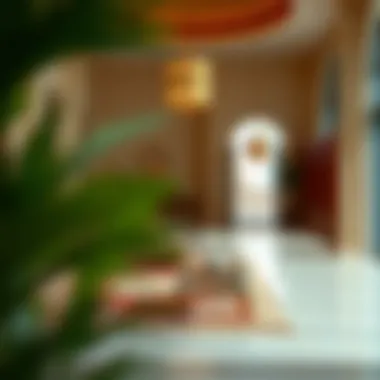

- Demand for rental properties: With many expatriates arriving in UAE for the month, there's an increased demand for short-term rentals. This provides opportunities for landlords to capitalize on increased transient populations.
- Promotions and offers: Landlords often initiate promotions for leasing properties during this time, making it attractive for potential tenants.
Investment Opportunities
Investing during Ramadan necessitates a keen understanding of both short-term and long-term trends, typically influenced by the unique cadence of the month. Engaging in the right investment during this period can yield significant returns, yet it requires due diligence and an appreciation for evolving market sentiments.
Residential Sector Trends
In terms of residential sector trends, the most significant aspect has been the shifting demand patterns. The key characteristic here is that families tend to seek properties that offer communal spaces. Homes near mosques and community centers often see a hike in interest due to their accessibility for prayer and gatherings. Additionally, the ongoing trend of leasing larger properties during this time can be viewed as a beneficial choice for those seeking temporary accommodation without the long-term commitment. However, one unique feature is that while demand may surge for certain areas, others can experience stagnation if they lack community facilities. This can put pressure on landlords to adapt quickly or risk prolonged vacancies.
Commercial Properties
Commercial properties during Ramadan illustrate a different narrative, as their dynamics play a pivotal role in market considerations. The key characteristic of commercial spaces, especially those located near shopping areas or food markets, becomes crucial. These properties see an influx of businesses looking to capitalize on Ramadan spending habits. Ramadan evenings often witness bustling foot traffic, which is a popular choice for investors looking to maximize their returns during this time.
Yet, targeting the right commercial investment falls on recognizing the unique feature of limited operational hours that many businesses adopt during Ramadan. While some might find this constrictive, it also means reduced maintenance costs. Investors who manage to navigate through these changes can achieve a steady income stream. Proper foresight into what buyers will value post-Ramadan will help navigate through these seasonal ebbs and flows in the market.
"The real estate market is like the ebb and flow of the tide; understanding its rhythms, especially during culturally significant times like Ramadan, can lead to sustained success."
Navigating the waters of real estate during Ramadan requires more than just market knowledge. It calls for an understanding of cultural repect and a greater appreciation for community dynamics, ultimately informing investment decisions that acknowledge the collective heartbeat of this vibrant society.
Advice for Residents and Visitors
Ramadan is a month that carries profound significance, not just for Muslims, but for everyone who finds themselves in a predominantly Muslim country like the UAE. For residents and tourists alike, understanding and respecting the customs prevalent during this period can enrich the experience and foster deeper connections with the local culture.
Respecting Cultural Norms
Respecting cultural norms during Ramadan is essential for both residents and visitors. The act of fasting is not merely about abstaining from food and drink from dawn until dusk; it embodies a spirit of compassion, humility, and community. For non-Muslims, showing respect implies understanding the sacredness of this month.
Observing the do’s and don’ts can lead to smoother interactions. Though many in the UAE are open and welcoming, it is wise to avoid eating, drinking, or smoking in public during fasting hours. This respect is not just courteous; it aligns with the core values of kindness and understanding that Ramadan promotes.
Navigating Daily Life
The unique rhythm of daily life during Ramadan can be somewhat different from the rest of the year. Those who understand these modifications will find themselves more at ease navigating through their routines.
Dining Etiquette
Dining etiquette during Ramadan is particularly important. At sunset, the fast is broken with Iftar, the evening meal. For those lucky enough to be invited, being mindful of local customs is vital. For instance, it’s essential to wait for the host to say a prayer before starting the meal, and often, dates are the first food to be consumed in accordance with tradition.
The communal aspect of Iftar is a beautiful feature, as it often sees families and friends gather, sharing not just the meal but also stories and laughter. However, for many who dine out, restaurants typically adjust their hours, opening up shortly before sunset. This can lead to crowded venues as folks flock to gather together and break their fasts. Therefore, it’s a prudent choice to plan ahead and possibly reserve a table to avoid disappointment.
Participation in Events
Participation in events during Ramadan allows both residents and visitors to engage in community spirit. Many malls and community centers often organize special Iftars and firework displays, which serve as fantastic opportunities to meet people and experience the festivity first-hand.
Local charity events proliferate during this time, encouraging contributions and interactions with various segments of society. Visitors are encouraged to partake, as this participation enhances understanding and bonds with the local community. However, it’s vital to remain sensitive to the solemnity of the month; thus, it is best to dress appropriately and maintain decorum throughout the event.
In summary, while navigating through daily life in the UAE during Ramadan requires some adjustments and respect towards local norms, it opens a door to rich cultural experiences and community engagement. By embracing the traditions, one can truly appreciate the beauty of the month and the warmth of its people.
Respecting the customs during Ramadan is not just about following rules; it is about understanding the essence of a culture that values togetherness, compassion, and charity.
For further insights into Ramadan traditions, you might visit Wikipedia or explore more through community forums like Reddit.
Ending
As we approach the end of our exploration into the Ramadan schedule for 2024 in the UAE, it's essential to reflect on the significance of this holy month and the multitude of dimensions it encompasses. Ramadan is not merely a time for fasting; it's a profound period of spiritual growth, community bonding, and cultural reflection. For investors, homebuyers, agents, and analysts in the UAE, understanding this context can offer valuable insights into market trends and community behavior.
Summary of Key Points
- Key Dates: Ramadan in 2024 begins around the evening of Sunday, March 10, and concludes with Eid al-Fitr, approximately on Tuesday, April 9, depending on the sighting of the moon. This timeframe is crucial for planning events, business operations, and personal observances.
- Fasting Times: Daily fasting times begin with Suhoor, the pre-dawn meal, and end with Iftar, the evening meal. For 2024, Suhoor may start around 4:45 AM and Iftar at around 6:20 PM, offering a significant window for communal gatherings and reflection.
- Cultural Practices: Observances during Ramadan extend beyond fasting. Prayer, especially Taraweeh, becomes a community focus, and the act of giving through Zakat and Sadaqah plays a pivotal role in fostering social responsibility. Community Iftars are a testament to the unity shared during this period.
- Economic Impact: Ramadan influences various sectors, notably retail and real estate. A surge in charitable contributions and a shift in consumer behavior can create both challenges and opportunities for businesses.
Looking Ahead to Eid
As Ramadan concludes, Eid al-Fitr ushers in a time of celebration. This festival not only marks the end of fasting but also symbolizes a new beginning filled with gratitude and joy. Families gather to partake in special meals, gift-giving, and community festivities. Investors should be mindful of the economic spike that follows Eid, as retail and hospitality sectors gear up for increased demand.
Individuals planning to participate in the post-Ramadan celebrations will find this transition marked by local traditions and events. From fairs to community activities, the sense of unity is palpable, echoing the values learned throughout Ramadan. Understanding these cultural nuances is key for anyone looking to navigate the UAE's vivid landscape effectively.




